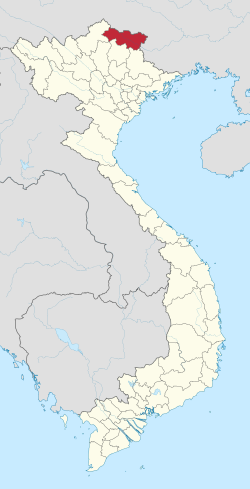Cao Bằng Province
|
Cao Bằng Province Tỉnh Cao Bằng |
|
|---|---|
| Province | |
 |
|
| Nickname(s): High Plateau | |
 Location of Cao Bằng within Vietnam |
|
| Coordinates: 22°40′N 106°0′E / 22.667°N 106.000°ECoordinates: 22°40′N 106°0′E / 22.667°N 106.000°E | |
| Country |
|
| Region | Northeast |
| Capital | Cao Bằng |
| Area | |
| • Total | 6,724.6 km2 (2,596.4 sq mi) |
| Population (2008) | |
| • Total | 528,100 |
| • Density | 79/km2 (200/sq mi) |
| Demographics | |
| • Ethnicities | Tày, Nùng, Dao, H'Mông, Vietnamese, Hoa, Sán Chay |
| Time zone | ICT (UTC+7) |
| Area codes | 206 |
| ISO 3166 code | VN-04 |
| Website | www |
Cao Bằng (![]() listen) is a province of the Northeast region of Vietnam. The province has borders with Hà Giang, Tuyên Quang, Bắc Kạn, and Lạng Sơn provinces within Vietnam. It also has common international border with Guangxi Province of the People's Republic of China. The province covers an area of 6,724.6 square kilometres, and, as of 2008, its population was 528,100 people.
listen) is a province of the Northeast region of Vietnam. The province has borders with Hà Giang, Tuyên Quang, Bắc Kạn, and Lạng Sơn provinces within Vietnam. It also has common international border with Guangxi Province of the People's Republic of China. The province covers an area of 6,724.6 square kilometres, and, as of 2008, its population was 528,100 people.
The area has a rich history tracing to the Bronze Age of the Tày Âu Kingdom in Vietnam. The dynasties which ruled the area were Tày lords, Be Khac Thieu and Nag Dac Thai. The province is in the region where the Vietnamese people lived thousands of years ago before their southwards expansion. Cao Bằng has several points of historical interest as well as many natural features such as the Pác Bó (at the mouth of the confluence of two rivers, the Bằng Giang and Hien rivers) where Hồ Chí Minh in January 1941 established a revolutionary force at Cốc Bó cave, the Mạc emperor's Temple, the Kỳ Sầm Temple, Coi Bin Church, the Bản Giốc waterfall area at the international border between Vietnam and China, and the Thang Hen Mountain Lake.
Cao Bằng's proximity to China has meant that it has had a somewhat turbulent history, having changed hands a number of times.
...
Wikipedia
